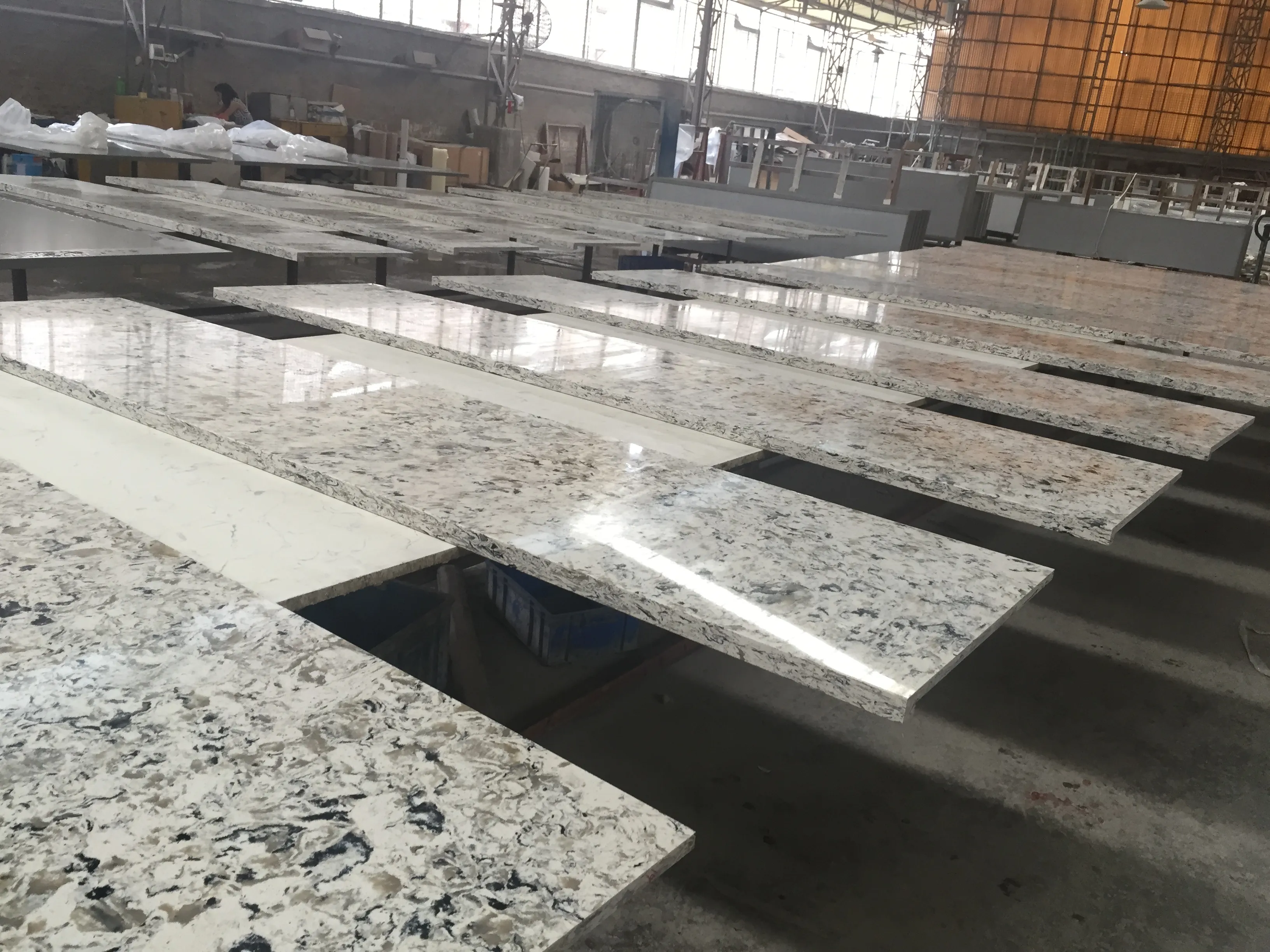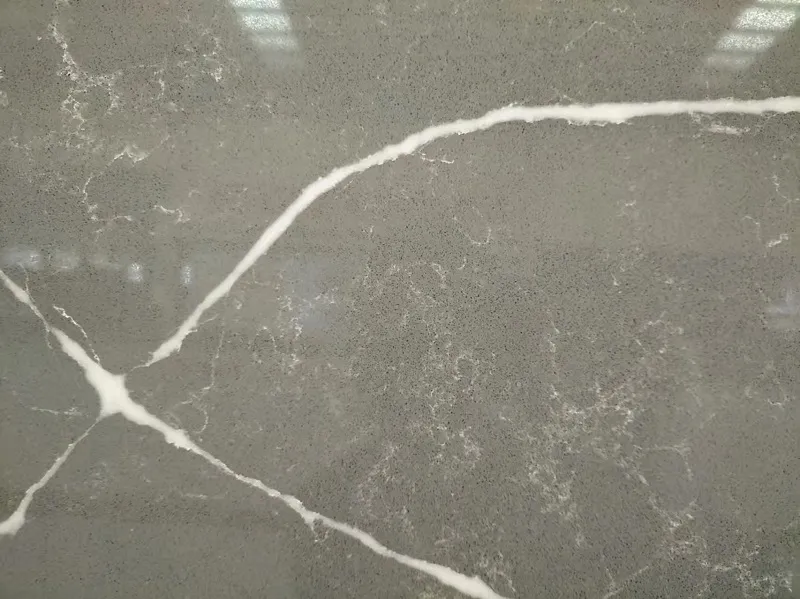As a widely used material in modern kitchen decoration, quartz worktops have been favored by more and more consumers in recent years. Its durability, beauty and easy maintenance make it the first choice in many kitchen designs. However, whether quartz countertops are suitable as materials for the specific functional area of the kitchen island is still a concern for many people.
In order to help consumers better understand the characteristics of quartz worktops and judge their applicability in kitchen islands, this article will conduct an in-depth analysis of quartz countertops from multiple aspects such as material characteristics, functional requirements, installation and maintenance, and usage experience.

What are the material characteristics of quartz countertops?
To discuss whether quartz worktops are suitable for kitchen islands, we must first understand the basic material composition and characteristics of quartz countertops. Quartz countertops are mainly made of more than 90% natural quartz mixed with a small amount of resin and pigment. Quartz is a mineral material with extremely high hardness, second only to diamond, which makes quartz worktops outstanding in scratch resistance and wear resistance. In addition, the surface of quartz worktops is very dense after processing and is not easy to penetrate water, which gives it excellent anti-fouling properties.
Durability of quartz countertops
The high hardness and firmness of quartz worktops make it have a long service life in high-frequency use environments such as kitchens. For areas such as kitchen islands that integrate meal preparation, cooking and social functions, the durability of the countertop is particularly important. Kitchen islands are often the center of kitchen activities and often have to withstand high-intensity use such as cutting ingredients and placing heavy objects. Therefore, it is crucial to choose countertop materials that are wear-resistant and impact-resistant. Quartz countertops undoubtedly perform well in this regard, far superior to other natural stones such as marble or granite.
Aesthetics of quartz countertops
Quartz countertops can present a variety of colors and textures by adding different colors of pigments, and are highly decorative. Whether it is a minimalist solid color design or a texture effect that imitates natural stone, quartz worktops can add beauty to kitchen islands. In addition, the surface gloss of quartz countertops is high, and after proper polishing, they can maintain a bright effect for a long time. As the visual focus of the kitchen, the beauty of the quartz countertop can undoubtedly add points to the overall design.
Environmental protection of quartz countertops
Compared with some countertop materials, quartz countertops have certain advantages in terms of environmental protection. The resin content used in its manufacturing process is low, and quartz, as a natural mineral, is non-toxic and harmless. In addition, due to its dense surface, the quartz worktop has good antibacterial properties and is not easy to breed bacteria or mold, which makes it safer and more reliable to use in places such as kitchens that focus on hygiene.

What are the functional requirements of kitchen islands?
In order to better evaluate whether quartz worktops are suitable for use as kitchen islands, we also need to have a deep understanding of the functional requirements of kitchen islands. Kitchen islands are not just an additional operating countertop, they often integrate meal preparation, cooking, dining and even social functions. This versatility requires that the materials of the island not only have good durability and beauty, but also outstanding practicality and ease of maintenance.
Meal preparation function
As a meal preparation area, kitchen islands often need to handle a variety of ingredients, including vegetables, fruits, meat, etc. This requires the countertop to have good anti-fouling properties, be easy to clean, and not easily leave stubborn stains due to contact with food. The density of quartz countertops makes it excellent in anti-fouling performance. Even if liquids with heavy pigments such as red wine and coffee are spilled on the countertop, they can be easily wiped clean.
Cooking function
In some home designs, a stove or sink may be installed on the kitchen island, which means that the island is not only a food preparation area, but may also undertake some cooking tasks. For islands with cooking functions, the countertop material must have good heat resistance. Although the heat resistance of quartz countertops in daily use is sufficient to cope with general cooking needs, its heat resistance is not impeccable. Compared with natural stone, quartz worktops may be damaged when exposed to high temperatures for a long time. Therefore, it is necessary to avoid placing overheated pots or baking trays directly on the countertop when using them.
Dining and social functions
In modern kitchen designs, kitchen islands often have the functions of dining areas and social spaces. Many people like to interact with family or friends at the island while preparing meals or enjoying light meals. This usage scenario requires that the island countertop should not only be durable, but also have a certain degree of comfort and beauty. The smooth and flat surface of the quartz countertop is very suitable for this demand. It is not only easy to clean, but also provides a comfortable touch for diners.
How to install and maintain quartz countertops?
In addition to the characteristics of the material itself, installation and maintenance are also important factors in evaluating whether quartz countertops are suitable for kitchen islands. Since quartz countertops are composite materials made by industrial processing, their installation process requires professional operation to ensure the flatness and firmness of the countertops.
Installation requirements for quartz worktops
Quartz countertops are usually installed on the kitchen cabinet according to the design size after cutting and polishing. Since quartz countertops are relatively heavy, it is necessary to ensure that the cabinet structure is stable enough to support the weight of the countertop during installation. In addition, the joint treatment of the countertop is also an important part of the installation. Although quartz worktops are generally made of large panels, in the design of large islands, multiple countertops are often required to be spliced, and the quality of the joint treatment directly affects the aesthetics and waterproofness of the countertop.
Quartz countertop maintenance
Compared with other countertop materials, quartz countertop maintenance is relatively simple. Its surface is dense and smooth, and daily cleaning only requires a mild detergent and a damp cloth. Quartz worktops do not need to be sealed regularly like natural stone, which saves a lot of trouble in later maintenance. However, although quartz countertops have strong scratch and stain resistance, it is still necessary to avoid using hard objects (such as metal knives) to cut ingredients directly on the countertop to avoid scratches. In addition, when handling high-temperature items, it is recommended to use an insulating pad or tray to avoid damage caused by direct contact with the countertop due to excessive temperature.
What are the advantages and disadvantages of quartz countertops?
Through the above analysis of the characteristics, functional requirements, and installation and maintenance of quartz countertops, it can be seen that the application of quartz countertops in kitchen islands has the following main advantages:
Advantages of quartz countertops
● Strong durability: Quartz worktops are hard and wear-resistant, and can withstand high-frequency use of kitchen islands.
● Good stain resistance: The surface is dense, stains are not easily penetrated, and it is easy to clean, which is especially suitable for use in food preparation areas.
● High aesthetics: A variety of colors and textures can meet the design needs of kitchens of different styles.
● Environmental protection and hygiene: The material is non-toxic, and bacteria are not easy to grow on the surface, which is very suitable for environments such as kitchens that require high hygiene standards.
Disadvantages of quartz countertops
● Limited heat resistance: Although quartz countertops have better heat resistance than many other composite materials, they may still be damaged under long-term high temperature. Therefore, direct contact with high-temperature objects should be avoided during use.
● Complex installation: Quartz countertops are heavy, have high installation requirements, require professional operation, and have high installation costs.

Is quartz countertop suitable for kitchen islands?
In summary, quartz countertops, as a material with excellent comprehensive performance, are completely suitable for use as countertop materials for kitchen islands. Its high durability, stain resistance and aesthetics make it perform well in multi-functional use scenarios such as food preparation, cooking and dining. Although its heat resistance is relatively limited, it can fully meet the daily use needs of kitchen islands through reasonable use and protection measures.
Therefore, for consumers who want to balance aesthetics and practicality, quartz worktops are an ideal choice for kitchen islands. Of course, when choosing quartz countertops, consumers still need to combine their own usage habits, budget and overall kitchen design style to make the decision that best suits their needs.

